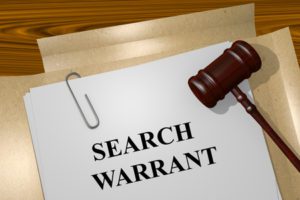 The Court continued in relevant part: On a motion to suppress evidence for which a warrant was obtained, the trial court’s review is limited to the information contained within the four corners of the supporting affidavit, as supplemented by sworn testimony before the issuing judge that is recorded contemporaneously. Here, the State properly identified the history leading up to the request for a search warrant in its affidavit. Context is important and helpful to the examining judge. Moreover, in a challenge to the validity of a search warrant, reviewing courts consider significant omissions from affidavits in assessing whether the warrant was supported by probable cause. That does not mean, however, that the grant of a forward-looking warrant can validate actions already taken. The State must provide evidence to support the reasonableness of the suspicion that led to the stop that can be tested through the adversarial process. That process would be defeated if the grant of a warrant could retroactively sanction a warrantless seizure. The trial court here afforded to the State ample opportunity to support the stop and scheduled a motion hearing for the determination of reasonable suspicion. Because the State presented no other evidence, the State did not carry its burden to prove the validity of the stop.
The Court continued in relevant part: On a motion to suppress evidence for which a warrant was obtained, the trial court’s review is limited to the information contained within the four corners of the supporting affidavit, as supplemented by sworn testimony before the issuing judge that is recorded contemporaneously. Here, the State properly identified the history leading up to the request for a search warrant in its affidavit. Context is important and helpful to the examining judge. Moreover, in a challenge to the validity of a search warrant, reviewing courts consider significant omissions from affidavits in assessing whether the warrant was supported by probable cause. That does not mean, however, that the grant of a forward-looking warrant can validate actions already taken. The State must provide evidence to support the reasonableness of the suspicion that led to the stop that can be tested through the adversarial process. That process would be defeated if the grant of a warrant could retroactively sanction a warrantless seizure. The trial court here afforded to the State ample opportunity to support the stop and scheduled a motion hearing for the determination of reasonable suspicion. Because the State presented no other evidence, the State did not carry its burden to prove the validity of the stop.
Here, there is no evidence that defendants’ car would have been searched if not for the unsupported stop. Without the stop, the officers would not have smelled marijuana, would not have called for a canine sniff, and would not have sought a warrant. The search was unquestionably incident to the stop, and the evidence obtained through the search was thus subject to suppression.
The State may have been spoiled by the recent trend in case law related to criminal justice reform and pretrial detention hearings. The trend is to allow the prosecutor to procced at a detention hearing via proffer and hearsay reports as opposed to live testimony.
